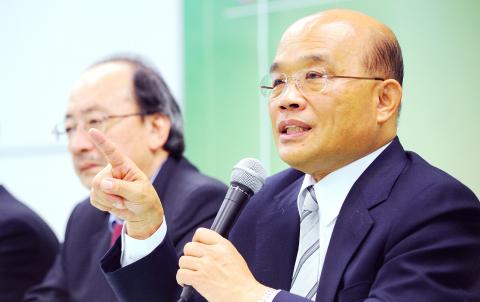The erosion of human rights under President Ma Ying-jeou’s (馬英九) administration, in particular regarding the judiciary and media, has placed Taiwan’s proud democracy in jeopardy and requires attention from the international community, the Democratic Progressive Party (DPP) said yesterday.
“The worsening situation of media development and judicial bias, along with the increasing impact of the ‘China factor,’ have all been serious threats to democracy in Taiwan. We call for the international community’s attention on the ongoing democratic crisis in Taiwan,” DPP Chairman Su Tseng-chang (蘇貞昌) told an international press conference called on Human Rights Day.
Su blasted what he said was Ma’s lack of progress on promoting and protecting human rights during his term, as well as his inaction on what he called the judiciary’s malicious prosecution of former DPP government officials and Beijing’s influence on Taiwan’s media.

Photo: Lin Cheng-kung, Taipei Times
The president’s silence on Tibet’s worsening human rights development and his refusal of the Dalai Lama’s visa were “unwise, incorrect and impolite,” Su said, adding that his party supports Tibetans’ calls for democracy and religious freedom.
Ma has not only sat and watched Beijing’s behind-the-scene maneuvering, he has been personally involved in the monopolization and control of Taiwan’s media, former Public Television Service general manager Sylvia Feng (馮賢賢) said.
Feng accused Ma of applying a three-part strategy to monopolize local media by first “paralyzing the public television system and controlling the Chinese Television System,” then following up with Want Want China Times Group’s (旺旺中時集團) “vertical integration of a cable television service and horizontal integration of its pending merger of the Next Media Group.”
Feng said Ma turned a deaf ear when renowned US-based historian Yu Ying-shih (余英時) of Academia Sinica categorically voiced his concerns about increasing Chinese influence on Taiwan’s media.
On the judicial front, other than the system’s relentless and malicious prosecutions of DPP politicians, most of which were later dropped, the president has failed to honor his promise to amend domestic laws that do not comply with a pair of international human rights covenants that his administration ratified in 2009, lawyer Kao Yung-cheng (高涌誠) told the press conference,
Ma has only paid lip service to the covenants because the 54 regulations listed by the Ma administration as incompatible with the covenants have not been amended three years after his administration ratified them, Kao said.
Implementing the Assembly and Parade Act (集會遊行法) was the most glaring example of Ma’s noncompliance with the covenants, Kao said.
Summing up Ma’s presidency over the past five years, DPP caucus convener Ker Chien-ming (柯建銘) said there were two major crises in Taiwan: first, people’s suffering from the sluggish economy; second, the backsliding of human rights and the re-emergence of authoritarianism.
The DPP legislative caucus also expressed concern about the human rights situation at a press conference held in the Legislative Yuan yesterday.
DPP Legislator Tsai Chi-chang (蔡其昌) said it was imperative for Ma to “roll up his sleeves and do whatever he needs to do on a wide range of human rights issues” because the government will not improve human rights simply by ratifying international covenants.

CHAOS: Iranians took to the streets playing celebratory music after reports of Khamenei’s death on Saturday, while mourners also gathered in Tehran yesterday Iranian Supreme Leader Ayatollah Ali Khamenei was killed in a major attack on Iran launched by Israel and the US, throwing the future of the Islamic republic into doubt and raising the risk of regional instability. Iranian state television and the state-run IRNA news agency announced the 86-year-old’s death early yesterday. US President Donald Trump said it gave Iranians their “greatest chance” to “take back” their country. The announcements came after a joint US and Israeli aerial bombardment that targeted Iranian military and governmental sites. Trump said the “heavy and pinpoint bombing” would continue through the week or as long

TRUST: The KMT said it respected the US’ timing and considerations, and hoped it would continue to honor its commitments to helping Taiwan bolster its defenses and deterrence US President Donald Trump is delaying a multibillion-dollar arms sale to Taiwan to ensure his visit to Beijing is successful, a New York Times report said. The weapons sales package has stalled in the US Department of State, the report said, citing US officials it did not identify. The White House has told agencies not to push forward ahead of Trump’s meeting with Chinese President Xi Jinping (習近平), it said. The two last month held a phone call to discuss trade and geopolitical flashpoints ahead of the summit. Xi raised the Taiwan issue and urged the US to handle arms sales to

State-run CPC Corp, Taiwan (CPC, 台灣中油) yesterday said that it had confirmed on Saturday night with its liquefied natural gas (LNG) and crude oil suppliers that shipments are proceeding as scheduled and that domestic supplies remain unaffected. The CPC yesterday announced the gasoline and diesel prices will rise by NT$0.2 and NT$0.4 per liter, respectively, starting Monday, citing Middle East tensions and blizzards in the eastern United States. CPC also iterated it has been reducing the proportion of crude oil imports from the Middle East and diversifying its supply sources in the past few years in response to geopolitical risks, expanding

An Emirates flight from Dubai arrived at Taiwan Taoyuan International Airport yesterday afternoon, the first service of the airline since the US and Israel launched strikes against Iran on Saturday. Flight EK366 took off from the United Arab Emirates (UAE) at 3:51am yesterday and landed at 4:02pm before taxiing to the airport’s D6 gate at Terminal 2 at 4:08pm, data from the airport and FlightAware, a global flight tracking site, showed. Of the 501 passengers on the flight, 275 were Taiwanese, including 96 group tour travelers, the data showed. Tourism Administration Deputy Director-General Huang He-ting (黃荷婷) greeted Taiwanese passengers at the airport and